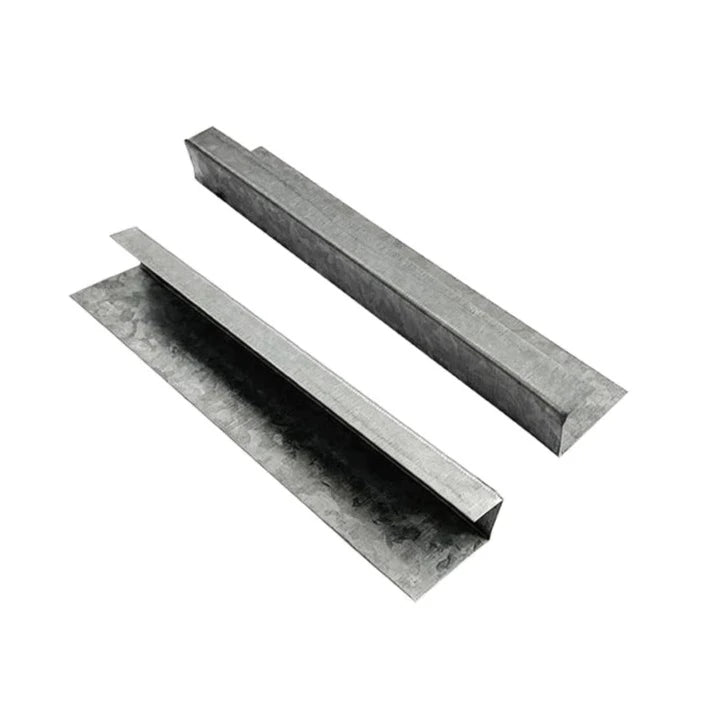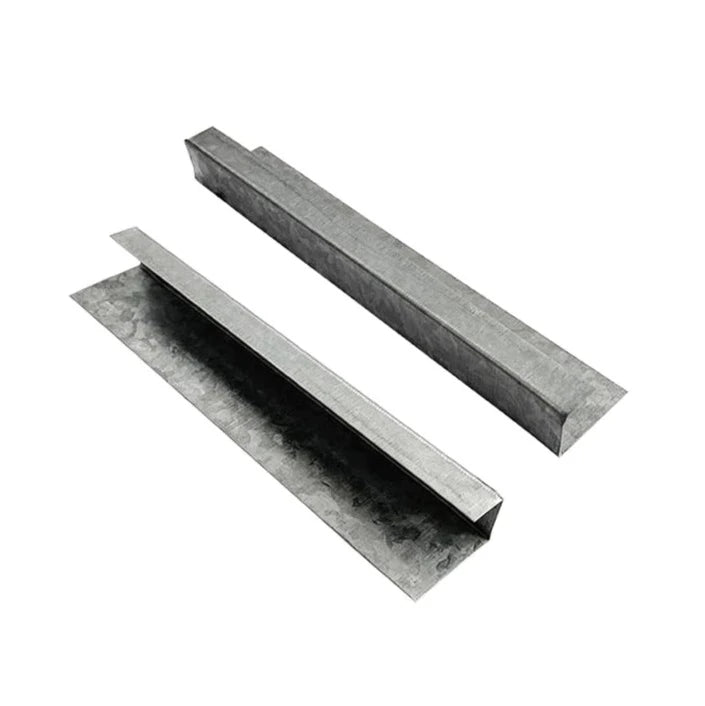- Sku: 10402
Rondo 142 - Wall Track for 16mm Furring Channel 3000
Product Description
Rondo 142 - Wall Track for 16mm Furring Channel 3000mm
16mm (h) x 13mm & 28mm (uneven leg) Wall Track - suits 308 Furring Channel
BMT: 0.50 | Stock Pack: 400 | Sub Pack: 20
Available Length: 3000mm
Where does Wall Ceiling deliver to?
Wall Ceiling is delighted to offer plasterboard delivery to metro Sydney.
For REGIONAL AREA, please email us at info@wallceiling.com.au with the items and quantities you need from our website, and we will promptly provide a manual quote.
How much do you charge for delivery?
Customer will receive an accurate delivery charge during checkout.
How long does it take to deliver the order and how much it will cost?
Delivery time frame varies by location:
| Location | Delivery Time Frame | Delivery Cost |
| Sydney | 1 - 3 business days | Starts from $45 |
| Central Coast | 3 - 5 business days | Flat delivery $195 |
| Wollongong | 3 - 5 business days | Flat delivery $195 |
| Bowral - Mittagong | 3 - 5 business days | Flat delivery $195 |
Some products may have a longer lead time which we will inform you as early as possible.
Who is responsible for unloading the materials off the truck?
Our delivery driver will assist you to unloading the materials next to the truck. However, it is the customer's responsibility to move the materials beyond that point.
Do you offer crane truck delivery?
No, we found hand unload or forklift on site is the most effectively way to unload plasterboard products.
What time will truck arrive during the delivery day?
It's difficult to predict precise delivery time due to factors such as traffic and weather conditions.
To facilitate a smooth delivery process:
- Our office will schedule and confirm delivery date with you after receiving your order.
- On the day of delivery, our driver will contact you before dispatching from warehouse to ensure you are prepared.
Do I need to be on-site to receive my delivery?
Yes, if you are not available, please kindly arrange another person to accept and help with unloading on your behalf.
Have a question?

What is a furring channel?
A furring channel is a type of metal framing used in construction to create a level, smooth surface for attaching wallboard, plasterboard, or other finish materials. They are typically made of light-gauge steel and provide a secure base to attach the finish materials away from the structural walls or ceilings.

The difference between a 16mm and a 28mm furring channel generally refers to the depth of the channel. Here's a brief explanation of each.
- 16mm Furring Channel
This channel would have a depth of 16mm. It is shallower and might be used for lighter applications where less space for insulation is needed, or where a lower profile is required to maintain ceiling height.
- 28mm Furring Channel
This channel would have a depth of 28mm. The 28mm furring channel is deeper than the 16mm furring channel and would typically be used in situations where more space is needed for insulation or where structural requirements call for a more robust channel to support the weight of the ceiling or wall material.
The choice between the two sizes would depend on the specific requirements of the construction project, including the type of materials being supported, the need for insulation or soundproofing, and the amount of space available. Deeper channels can often provide better acoustical performance and can accommodate thicker layers of insulation, but they also take up more space.
When selecting furring channels, it's also important to consider other dimensions such as the width and the gauge (thickness) of the metal, as well as the spacing of the channels during installation, which can all affect the performance and suitability for your specific application. Always refer to local building codes and manufacturer recommendations when selecting and installing furring channels.

How to install metal furring channel ceiling?
To install a metal furring channel ceiling, first, determine the layout and spacing according to the local building codes and the manufacturer's recommendations.
Rondo KEY-LOCK Suspended Ceiling System
The KEY-LOCK Ceiling System enables the mixing of primary Top Cross Rail and secondary components Furring Channel to increase spans, suspension fixing points and maximise structural design. The components within Rondo ceiling system have been expertly designed to simply snap into sections, without the need of mechanical tools. This allows an easy to install ceiling system, and speeding up your valuable time on site.
Rondo KEY-LOCK Direct Fixing Ceiling System
If you need a more direct approach, Rondo supplies a wide range of direct fixing clips that allows you to direct fix Furring Channels or Ceiling Battens to either concrete, steel or timber ceiling structures. Direct fixing clips need to be fixed along the sections in accordance with the relevant maximum span tables, and each Furring Channel is required to be spaced as per the building board manufacturers' recommendations.
How to install furring channel clips?
Furring channel clips are used to attach furring channels to the main support structure. To install, clip the furring channel into the main channel or directly to the structural element as per the instructions. Ensure the clip is securely fastened and provides a firm hold for the furring channel.
Are furring channels and top hats the same thing?
No, furring channels and top hats are not the same.
While both are used in construction, top hats are typically used for roofing and siding applications to provide a fixing point for cladding materials. Furring channels, on the other hand, are used primarily in interior applications to create a framework for attaching wall or ceiling materials.

How far can furring channel span?
The span of a furring channel can vary depending on the manufacturer's design and the load it is intended to carry. Typically, the span can range from 600mm to 1200mm. However, always refer to the engineering specifications for the particular product you're using for exact span measurements.
What is a resilient furring channel?
A resilient furring channel is a type of furring channel designed to reduce sound transmission through walls and ceilings. They are part of a system that includes sound-dampening materials and are used to improve the acoustic properties of a space. The resilience comes from the design that allows for slight movement, which helps in absorbing and dissipating sound waves.
Need more information?
Please contact us and speak to one of our friendly team member for more information related to furring channels.


